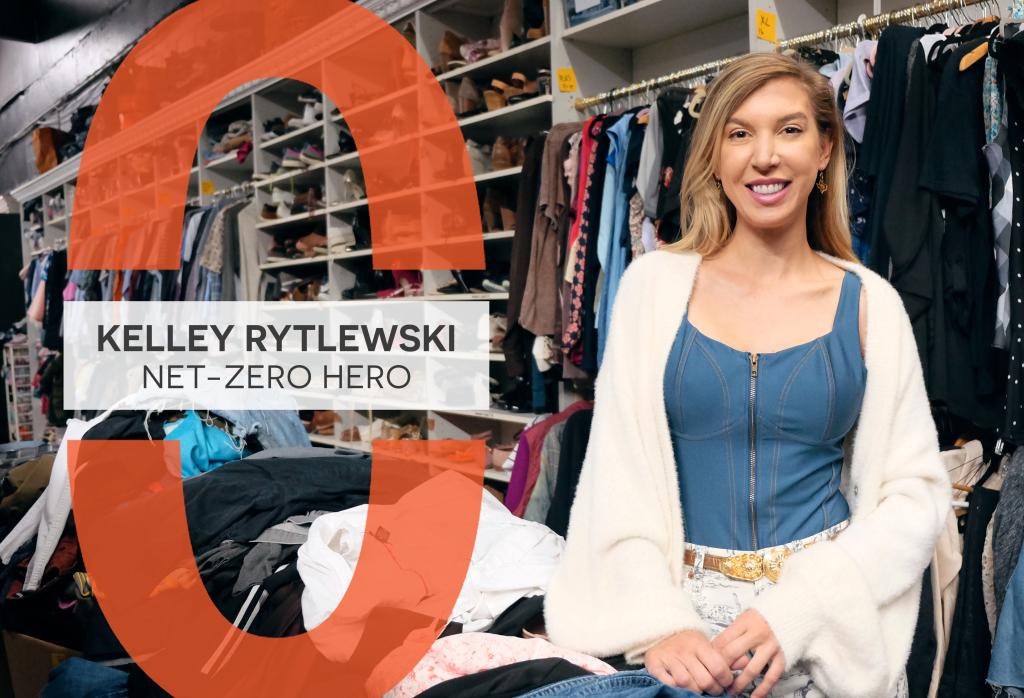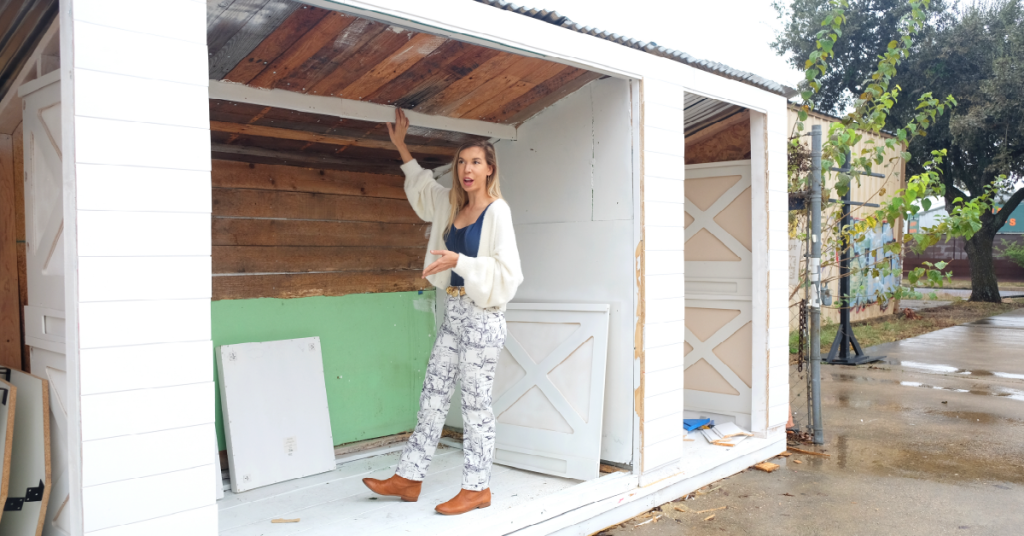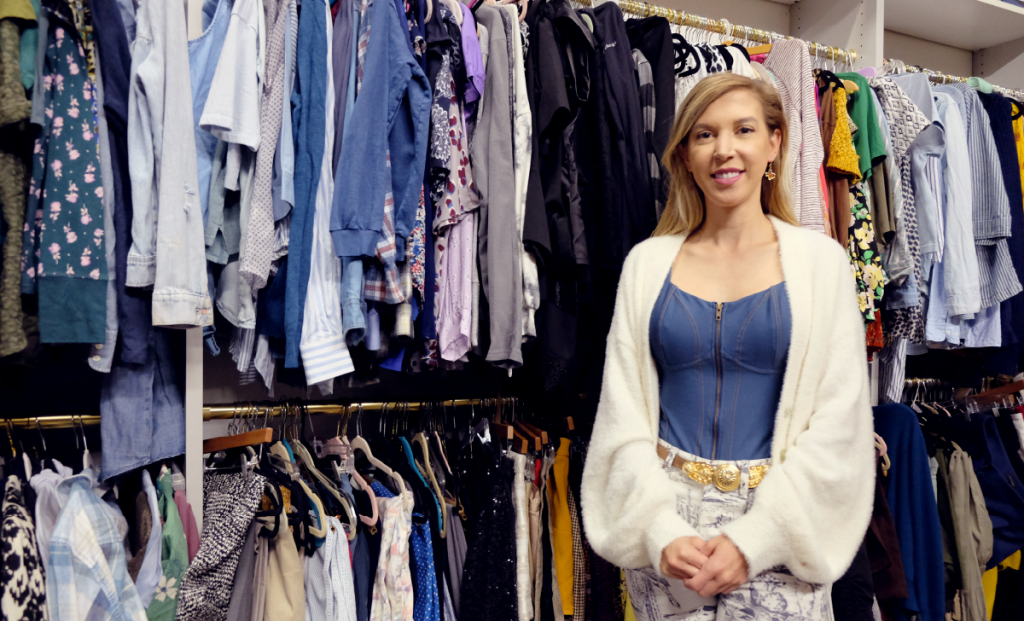Net-Zero Hero: Kelley Rytlewski

I’m helping to make Austin Net-Zero by giving away over 100,000 secondhand garments a year for free — from the Austin community back to the Austin community.
Meet our newest Net-Zero Hero: Kelley Rytlewski! Founder of Heartening, Kelley is on a mission to take meaningful action to reduce waste, connect community, and build a more sustainable future in Austin. What began as a small operation run from her home has now grown into a bustling donation sorting room that redistributes thousands of items every month for free to neighbors in need. Kelley’s innovative approach to sustainability is rooted in community connection: by creating a network for sharing and giving locally, Heartening proves that “we have enough to go around — if we make it go around.” With a deep belief in circular living and community resilience, Kelley and Heartening are addressing pressing challenges like economic hardship, homelessness, and extreme weather, all while tackling the massive issue of textile waste.
We caught up with Kelley at Heartening’s new donation sorting room to learn more about what drives her work, the toughest parts of leading a community-based organization, and her vision for the future of Heartening.
What inspired you to take action?
My inspiration came from a deep and growing frustration with the waste generated in our own community — of perfectly good items getting carelessly tossed for convenience or dumped at large-chain thrift stores.
The vast majority of donated items across our county are given to a few large-chain thrift stores because it is often easier for folks to dump everything in one place. But if you start to look into their models, you’ll find that many of these chains have frustrating practices around sustainability and skyrocketing prices. Many ship off their excess items in 1,000-pound bales for cents on the dollar to textile traders (who then ship them to developing countries) rather than give away items for free to the very communities they operate in.
After getting laid off during the Twitter tornado two years ago, something inside me compelled me to start a community-based donation sorting room to responsibly and thoughtfully rehome unwanted items within our local community. This project started "heartfirst" and quickly gained momentum through the kindness, sweat, time, love, and generosity of a community with shared principles and passions.
I founded Heartening on the belief that we can solve for sustainability through community. We, as a community, have enough to go around — if we make it go around. I believe living a sustainable lifestyle requires knowing and loving your community by giving items you are not using to neighbors who need them, and, in turn, being able to buy, borrow, swap, or freely receive items you need from your community secondhand. When people feel connected to a sharing community, they are more able to give away items they aren't using because they have faith that they can get items from their community should a need arise.
.png)
Kelley sorts donated items at Heartening’s donation sorting room. All items are $3.
How did you do it?
Our mission is to rescue items for reuse within the local community. While the purpose is sustainability, the heart is community. We believe awakening the community to the needs around us inspires them to give items through in-kind donations so that we can route them to where they are needed most.
Our history began with the creation of a database cataloging where to donate any item responsibly in Austin. That grew into a physical practice of sorting and delivering items, operating inside a living room and garage. Eventually, we were able to lease a teeny tiny 390-square-foot commercial space in January 2024 as our "Heartening Donation Sorting Room." Our donations grew from about 350 items per WEEK to 350+ items per DAY and counting. This translates to sorting 11,000+ items monthly (primarily clothing) and giving away over 10,000 items for free every single month to neighbors who simply need clothing: immigrants, young mothers, social workers (for their clients), teachers (for their students), schools (who host clothing closets), unhoused neighbors who come to our door, and to mutual aid groups and nonprofits who primarily serve the unhoused, harm reduction services, domestic violence survivors, and survivors of human trafficking. To educate the community on best practices, we document our work and where we donate through our Instagram (@hearteningaustin).
.png)
A shopper pulls items from Heartening’s shelves.
We've become experts in running an ultra-high-efficiency sorting process and rapidly giving items to where they are needed and wanted. We rely on maintaining a collaborative network among other groups in Austin and act as a central 'load balancer' that takes in items and routes them to where they are needed most. A proper donation match requires giving the right items at the right time, in the right place, and in the right quantity to truly be helpful. Therefore, data, collaboration, and volunteers are vital to our operations. Our volunteer slots are in high demand and fill quickly because volunteers chat the whole time, often exchanging numbers and becoming friends. We do all of this with one unpaid highly-motivated person on "staff" (me) and a shoestring annual operating budget under $75,000. We have the human power, methodology, cost-efficiency, innovative spirit, and heart to create real change.
.png)
Volunteers sort donated items in Heartening’s donation sorting room.
What’s been most rewarding about getting involved in this way?
The most rewarding part of this project has been seeing our concept take root and grow rapidly. 2024 was a busy year about proving that our concept could work and becoming truly community-driven.
After ten months in our small space, we are already ready to grow to a bigger spot and just moved into a space that is triple the size — with additional outdoor space where we can build our vision of Heartening's Free Stand. Our future Free Stand aims to give away 1,000 items per day in 2025 — equating to 300,000+ items over the course of the year!

Kelley talks about the second-hand free pantry frame that Heartening is transforming into a free stand.
Our new space is still in development, but we remain open to the public for shopping. For every ten items we receive, nine are given out for free and one is stocked on our shelves for secondhand shopping. Everything in our store is $3, whether it be a winter coat, a pair of shoes, or a frying pan.
We were recently awarded the "Best Benevolent Mission" in Austin Monthly’s 2024 Best of ATX Awards. We also just surpassed donating our 100,000th item. Now, we are in a chapter of taking a leap of faith and scaling to a larger space.
.png)
Above: Kelley checks the size of a garment for sorting. Below, left: A sign welcomes shoppers in the new space; right: racks display a colorful collection of donated clothing for shoppers.
What’s been the toughest part?
The toughest parts have been the physical exhaustion, mental burnout, loneliness, compassion fatigue, and the constant pressure to grow with very few resources.
Heartening was recently awarded a Food and Climate Equity Grant. Can you talk about the process of applying and what you plan to do with the grant funding?
Heartening was sent the grant application by multiple other organizations that we give clothing to, telling us, “You should apply.” We operate under the fiscal sponsorship of a 501(c)3 nonprofit called Keep Austin Neighborly. Other projects they sponsor also received the same grant. I don’t come from the nonprofit world so navigating grants and fundraising has been a serious challenge and learning opportunity. I’m deeply appreciative of the tips and nominations we receive from the community.
Heartening believes in circular living and, as part of that, community giving. We strive to be zero-waste and practice intentional, thoughtful giving. We applied for the grant to help us continue our work of providing free clothing to those who need it most in Austin. Through the grant, we’ll focus on community resilience — a community's ability to persist and thrive in the face of hardships. Hardships here take the form of job losses and layoffs, domestic violence, human trafficking, homelessness, the extreme heat waves, the winter storms, and the overall rising cost of living in Austin. What we've witnessed firsthand is that free clothing brings relief and joy. It can help lift a little burden off of our neighbors’ shoulders. In a small way, the practice can help acknowledge their struggle, validate that the world is often unfair, and recognize that circumstances are out of our control.
.png)
Volunteers are crucial to Heartening’s mission. Above, a group of volunteers sort donated items by size.
Can you share some of the more unique donations that Heartening has helped facilitate?
The reality is, that unique items are incredibly time-consuming to deal with and often do not serve an immediate need in the community. Heartening’s Sorting Room focuses on clothing, so we ask that you please not bring us your “unique” items. As we were beginning, we did accept a wider range of items but found that they cost us a great deal more time and money to deal with than we could ever salvage from them to continue operating.
Figuring out what to do with beauty products that are ten years past their expiration date or the human baby teeth that get dropped off — both real examples! — takes valuable time and energy away from the work there is to do.
What advice do you have for others?
Buy less, reuse more.
I also encourage people who are interested to consider volunteering with us to witness the mountain range of clothing that comes in daily. So many people need to see the scale of the problem in person to appreciate the magnitude of the waste consumerism generates and how the crisis affects our own local community. You can sign up for a 2-hour volunteer shift using our online calendar.

This holiday season, help support Austin’s goal of being zero waste by 2040 by rethinking your gifting. Consider giving secondhand items, gifting a local experience (like a museum membership), or repairing something meaningful. To learn more about Austin's net-zero goal and explore actions you can take to support a greener community, view the Austin Climate Equity Plan.
Share your Net-Zero contributions with us on Facebook or X, and use #NetZeroHero. If you know a Net-Zero Hero (or heroes!) who should be recognized for their efforts, send your nomination to sustainability@austintexas.gov.
